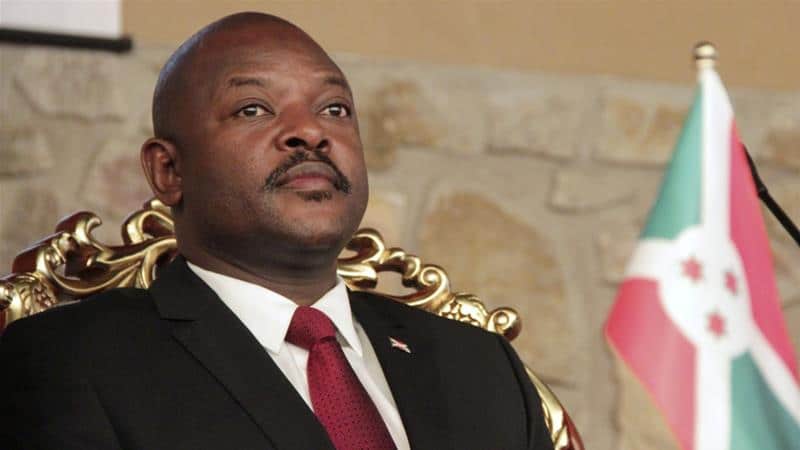Pierre Nkurunziza, the outgoing president of Burundi has died of a heart attack on June 8, 202o aged 55. Though many suspect it was Covid-19. His 15-year-rule was filled with brutal repression mainly towards the end.
He rose to power at the end of 12-year civil war and was a former rebel leader whose first mandate was given to him by the Burundi parliament in 2005. He won a re-election in 2010 but a third-term bid in 2015 stirred up the unrest.
When Nkurunziza first came to power following the 1993-2005 Burundian civil war, where Hutu rebels fought the Tutsi-led army, he had seemed truly committed to peace and democracy. As the leader of the CNDD–FDD (National Council for the Defence of Democracy – Forces for the Defence of Democracy) Hutu rebel group, he had begun negotiating a peace deal in 2001. Two years later he signed the Arusha agreement, which ended the civil war, where 300,000 people died. His rebel group became a political party and he joined the transition government as a minister for good governance.
In 2005 Nkurunziza became president after his party won the elections by a landslide. A year later he lifted a curfew that had been in place since 1972. In 2007 Burundian soldiers joined an African Union (AU) peacekeeping force in troubled Somalia. The Paris Club group of creditors cancelled Burundi’s debt in 2009.
But after being re-elected with 92% of the vote in the 2010 poll, which was boycotted by many opposition candidates, Nkurunziza became increasingly authoritarian, power-hungry and intolerant. In 2014 he actually banned jogging out of “fears it could be used by his opponents as a cover for subversion”.
Another Hutu-Tutsi conflict was brewing which led to the AU approving a pre-emptive deployment of a 5,000-strong African Prevention and Protection Mission in Burundi in 2016, which has still not been deployed because Nkurunziza objected to it.
The ills of colonization still haunts post-independence Africa and few are as destructive as the Hutu-Tutsi divide. In near by Rwanda in 1994 it led to a genocide in which 800,000 mostly Tutsis were killed by the Hutus. Twenty years earlier, it was repeated in Burundi, and led to a mass killing of mostly Hutus by the Tutsi-led army following a failed Hutu coup in 1972.
Almost all recent Hutu leaders, including the country’s first democratically elected president, Melchior Ndadaye, whose assassination triggered the 1993 civil war, was a 1972 refugee. Nkurunziza’s father, Eustache Ngabisha, a former member of parliament and governor of Ngozi and Kayansi provinces, was killed during the 1972 ethnic killings. Nkurunziza was eight years old at the time of his death.
Nkurunziza studied physical education at the University of Burundi. After graduation in 1990, he worked as a high school PE teacher at Muramvya high school. He married Denise Bucumi, who later became a pastor, in 1994.
The following year, while working as a lecturer at the University of Burundi, in Bujumbura, Nkurunziza was shot at during a Tutsi attack on the campus, which killed hundreds of students. He joined one of several rebel Hutu groups, CNDD–FDD, as a soldier. Two of his six siblings were killed after civil war erupted in 1993 and three others died while fighting with CNDD-FDD. By 1998 Nkurunziza was promoted to deputy secretary-general of the group, and in 2001 became it leader.
He handled the protests caused by his third-term bid in 2015 with cruel violence. Over the next two years, his militia group, known as the Imbonerakure, as well as various state security forces, killed more than 1,200 Burundians trying to stop street protests. Four hundred thousand more fled the country.
Nkurunziza spent much of that time organising prayer meetings.
When donors cut aid, he stopped most foreign media outlets from reporting inside Burundi. When the international criminal court (ICC) started investigating crimes against humanity in 2017, he responded by withdrew Burundi from the Rome statute becoming the first nation ever to do so. In 2019, he went a step further and shut down the UN’s human rights office in the country after 23 years, claiming he had made sufficient progress in human rights.
Following the violence that accompanied his 2015 unconstitutional re-election, his party eventually persuaded him to step aside to appease the growing tension in the country. His fellow party member Evariste Ndayishimiye won last month’s presidential election. Nkurunziza was elevated to the status of “Paramount Leader and Champion of Patriotism”, a title that came with a $535,000 retirement package and villa.
Meanwhile to fill the vaccum, Burundi’s Constitutional Court said President-elect Evariste Ndayishimiye should be sworn in as soon as possible. This is instead of the Speaker of parliament, Pascal Nyabenda, becoming the interim leader as would have been.
He is survived by his wife Denise, by five children, Kelly, Kevin, Jonathan, Naomi and Dorcas, and a sister.

